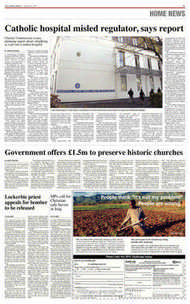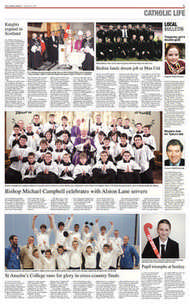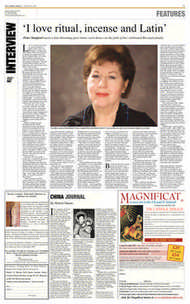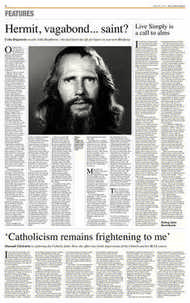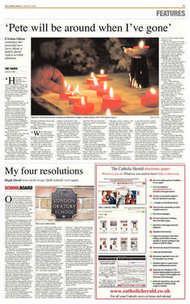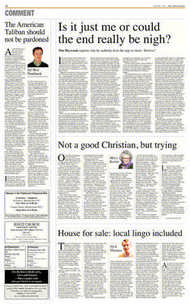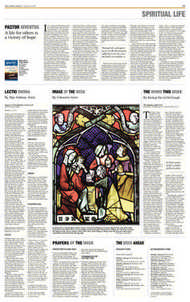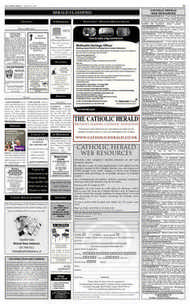Page 1, 2nd January 2009
Page 1

Report an error
Noticed an error on this page?If you've noticed an error in this article please click here to report it.
Tags
Share
Related articles
Uphold Rights Of Migrants, Says Benedict Xvi
Christ Offers Hope Of Better World, Says Pope
Pope: Only In Silence Can God’s Love Sink In
Bush Pays Farewell Visit To Pope
Easter Does Not Work Magic, Says Benedict
Poverty should outrage us, says Pope
BY CAROL GLATZ
BUILDING peace and eradicating poverty demand an overhaul of short-sighted financial policies and unjust economic and social structures, Pope Benedict XVI has said.
In his annual message for the January 1 celebration of the World Day of Peace, the Pope said that “peace can be built only if everyone is assured of the possibility of reasonable growth. Sooner or later, the distortions produced by unjust systems have to be paid for by everyone.” The world of finance and commerce need global governance and a new ethical approach that can ensure that investments and development truly contribute to the common good and peace in the world, he said.
The message, “Fighting Poverty to Build Peace”, was sent to heads of state around the world.
The Pope said that while globalisation had brought many benefits it must be governed and “managed with great prudence”.
Policies and norms must be based on a common code of ethics, he said, and actions must be guided by “the principles of fraternity and responsibility”.
With natural law, God has inscribed upon every conscience a deep yearning to uphold the common good and peace in the world, he said.
Closing the gap between rich and poor will only happen if people everywhere listen to their conscience and “feel personally outraged by the injustices in the world and by the concomitant vi olations of human rights”, he said. “It is utterly foolish to build a luxury home in the midst of desert or decay.” The world of finance has lost sight of its most important function which is “to sustain the possibility of long-term investment and hence development”, he said.
He added that the current economic and financial crises were the result of financial activities – on both the national and global level – that are “based upon very short-term thinking”.
Financial practices that are limited to the short term become “dangerous for everyone, even for those who benefit when the markets perform well”, he said.
By not taking into long-term consideration the common good investments lose their “capacity to function as a bridge between the present and the future” and to stimulate new businesses and job opportunities in the long term, said the Pope.
He said economic and legal structures must work together to come up with and implement strategies to fix current shortcomings in the financial and commercial world and create incentives for more appropriate behaviour.
Overcoming the scandal of poverty means addressing the institutional, material and cultural causes of poverty along with the spiritual and moral flaws that are “harboured in the human heart, like greed and narrow vision”, he said.
It is not enough to skim off one’s surplus to redistribute to the poor, he said. A real change of heart, “of lifestyles, of models of production and consumption and of the established structures of power” governing communities, is urgently needed.
Pope Benedict said that when people show a lack of respect for the transcendent dignity of every human person “the cruel forces of poverty are unleashed”.
He criticised some major causes of poverty and economic inequality, such as immense military spending, the inadequate distribution of food resources and price speculation in food commodities.
Because many have linked high birthrates to poverty, some family planning campaigns have used methods that violate the right of parents to responsibly choose how many children to have, the Pope said. This has caused “the extermination of millions of unborn children, in the name of the fight against poverty”.
The Pope noted that despite marked demographic growth the percentage of the world’s population living under the threshold of absolute poverty has been cut in half since 1981.
In fact, some of the nations that have emerged today as new economic powers “have experienced rapid development specifically because of the large number of their inhabitants”, the Pope said.
“Population is proving to be an asset, not a factor that contributes to poverty,” he added.
Some countries afflicted by pandemic diseases like HIV/Aids are sometimes “held hostage, when they try to address them, by those who make economic aid conditional upon the implementation of anti-life policies”.
While Aids is a major cause of poverty in the world, the disease must be fought with educational campaigns and “a sexual ethic that fully corresponds to the dignity of the person”, he said.
Life-saving treatment and medicines must be made available to poorer populations, which may call for the “flexible application” of international rules protecting drug patents, he said.
Pope Benedict argued that people should also be concerned about forms of poverty that have nothing to do with a lack of basic physical necessities. For example, he said, even people living in wealthy societies can experience marginalisation or “affective, moral and spiritual poverty”.
Cardinal Renato Martino, president of the Pontifical Council for Justice and Peace, presented the message to the press on December 11.
He said the Pope’s emphasis on so-called “moral underdevelopment” and the negative consequences of “superdevelopment” referred to a rising lack of respect for the right to life as seen in the growing number of laws permitting abortion, assisted suicide and euthanasia.
blog comments powered by Disqus




